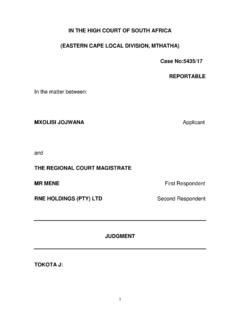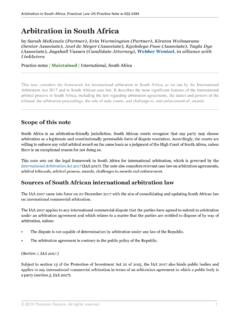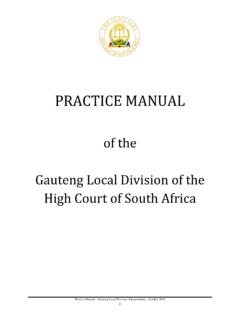Transcription of CONSTITUTIONAL COURT OF SOUTH AFRICA
1 CONSTITUTIONAL COURT OF SOUTH AFRICA Case CCT 200/16 In the matter between: SINETHEMBA MTOKONYA Applicant and MINISTER OF POLICE Respondent Neutral citation: Mtokonya v Minister of Police [2017] ZACC 33 Coram: Nkabinde ADCJ, Cameron J, Froneman J, Jafta J, Khampepe J, Madlanga J, Mhlantla J, Mojapelo AJ, Pretorius AJ and Zondo J judgments : Zondo J (majority: [1] to [86] Jafta J (dissenting): [87] to [185] Heard on: 16 March 2017 Decided on: 19 September 2017 Summary: [knowledge required by section 12(3) of Prescription Act] [knowledge of legal conclusion or that creditor has a legal remedy not required by section 12(3)] [only knowledge of identity of debtor and facts giving rise to debt required] [leave to appeal is granted] [appeal is dismissed] [no order as to costs] 2 ORDER On appeal from the High COURT of SOUTH AFRICA , Eastern Cape Local Division, Mthatha, the following order is made: 1.)
2 Leave to appeal is granted. 2. The appeal is dismissed. 3. There is no order as to costs. JUDGMENT ZONDO J (Cameron J, Froneman J, Khampepe J, Madlanga J, Mhlantla J and Pretorius AJ concurring): Introduction [1] This case is about extinctive prescription. In particular, it is about whether section 12(3) of the Prescription Act1 requires a creditor to have knowledge that the conduct of the debtor giving rise to the debt is wrongful and actionable before prescription may start running against the creditor. That is the question that this COURT will be called upon to decide if we grant the applicant leave to appeal. 1 68 of 1969. Section 12(3) reads: A debt shall not be deemed to be due until the creditor has knowledge of the identity of the debtor and of the facts from which the debt arises: Provided that a creditor shall be deemed to have such knowledge if he could have acquired it by exercising reasonable care.
3 ZONDO J 3 Background [2] The applicant instituted an action in the Eastern Cape Local Division of the High COURT , Mthatha,2 against the respondent for damages for wrongful arrest and detention by the SOUTH African Police Service. He was arrested on 27 September 2010 and detained for four or five days before being released. The respondent delivered a special plea in terms of which he pleaded that the applicant s claim had prescribed. Thereafter, the parties agreed to submit a special case on prescription for adjudication by the COURT in terms of rule 33(1) of the Uniform Rules of COURT . A special case is submitted to COURT for adjudication by way of a statement agreed to between the parties setting out the agreed facts, the question of law that the parties ask the COURT to decide, the parties contentions and the relief they seek.
4 [3] The parties submitted an agreed statement in terms of rule 33. After identifying the parties, the agreed statement reflected the following as the agreed facts giving rise to the claim , the dispute , the parties contentions and the relief sought : AGREED FACTS GIVING RISE TO THE CLAIM 3. The plaintiff: was arrested and thereafter detained by members of the SOUTH African Police Service at Engcobo Police Cells on the 27 September 2010; at the beginning of July 2013 met with Mr Nkululeko Babe, an attorney of this COURT and Plaintiff s neighbour, who during the course of their interaction enquired about the outcomes of the criminal case in respect of which the plaintiff had been arrested by the Police on the 27 September 2010 and who, on being informed that the plaintiff was never taken to COURT following his arrest but 2 Mtokonya v Minister of Police [2015] ZAECMHC 67 (High COURT ).
5 ZONDO J 4 was released by the police on the basis that when they need him, they will call on him again to attend and present himself at COURT . Mr Babe informed him at the beginning of July 2013 that he, the plaintiff: was not supposed to be detained in excess of a period of 48 hours without him having been made to appear before a COURT of law; was wrongfully and unlawfully: misled by the Police into believing that they will at some point call upon him to attend COURT simply to conceal the wrongfulness of their conduct, but never call him; and arrested and detained by the Police in circumstances where they had no reason to believe that he had committed an offence; has a cause of action against the Minister of Police for unlawful arrest and detention. issued a statutory notice pursuant to the provisions of section 3 of the Institution of Legal Proceedings Against Certain Organs of State Act, 2002 (Act NO.)
6 40 of 2002) in July 2013; and issued and thereafter served summons against the Defendant in April 2014. THE DISPUTE 4. The matter has been set down for determination of the question whether the plaintiff s claim has prescribed or not. THE PARTIES CONTENTIONS 5. The defendant contends that the plaintiff s claim has prescribed and the plaintiff disputes this issue. 6. The plaintiff contends that before his meeting with Mr Nkululeko Babe at the beginning of July 2013, he did not know that: the conduct of the Police in not bringing him before a COURT of law within 48 hours following his arrest on the 27 September 2010 was wrongful and actionable; ZONDO J 5 at the time of his arrest the Police did not have information upon which they could have formed a reasonable belief that he had committed the offence for which he was arrested and thereafter detained; and he could sue the police.
7 RELIEF SOUGHT 7. The defendant prays for: an order upholding the special plea of prescription; and dismissing the plaintiff s claim with costs. 8. The plaintiff prays for an order dismissing the special plea with costs. [4] From the agreed statement it is clear that the broad dispute arising from the special plea was whether the applicant s claim had prescribed. The respondent contended that it had prescribed whereas the applicant contended that it had not. That this was the case was reflected in paragraph 5 of the agreed statement. Paragraph 5 read: The defendant contends that the plaintiff s claim has prescribed and the plaintiff disputes this issue . To decide that broad question, the parties asked the COURT in the agreed statement to answer the question raised by the applicant s contention on why he took the position that his claim had not prescribed.
8 [5] As to what the question of law was that the parties asked the High COURT to decide in order to determine whether the applicant s claim had prescribed or not, one has to look at paragraphs and of the agreed Paragraph read with raises the question whether the applicant s lack of knowledge that the conduct of the police in not bringing him before a COURT of law within 48 hours following his arrest on 27 September 2010 was wrongful and actionable and that he could sue the police had the effect of preventing prescription from running against him. Subparagraphs and must be read against the respective outcomes each party wanted if the COURT upheld its contention on prescription. In paragraph 7 the respondent asked for an order upholding the special plea on prescription and 3 Paragraph is irrelevant to prescription and was not relied upon by Counsel for the applicant.
9 ZONDO J 6 dismissing the plaintiff s claim with costs whereas the applicant asked for an order dismissing the special plea with costs. [6] The question of law that the parties effectively asked the High COURT to decide was whether a creditor is required to have knowledge that the conduct of the debtor giving rise to the debt is wrongful and actionable before prescription can start running. The applicant s contention was that such knowledge was required whereas the respondent contended that it was not. High COURT [7] The High COURT held that such knowledge was not a requirement before prescription could begin to run. Consistent with what the parties clearly expected the COURT to do if it reached that conclusion on the issue, the High COURT went on to conclude that, therefore, the applicant s claim had prescribed, upheld the respondent s special plea and dismissed the applicant s claim with costs.
10 The High COURT held that the question whether or not the conduct of the debtor giving rise to the debt is wrongful and actionable is a conclusion of law and not a fact whereas section 12(3) of the Prescription Act requires the creditor to have knowledge of the facts from which the debt arises . In concluding that a creditor did not need to have knowledge that the conduct of the debtor giving rise to the debt is wrongful and actionable before prescription may begin to run, the COURT relied upon the text of section 12(3) of the Prescription Act as well as Claasen4 and the cases discussed in that case on the issue of whether section 12(3) requires a creditor to have knowledge of a conclusion of law before prescription can begin to run. Those cases include Van Staden,5 Gore6 and 4 Claasen v Bester [2011] ZASCA 197; 2012 (2) SA 404 (SCA).















